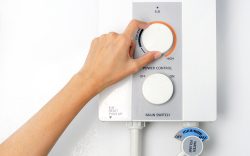How Tankless Water Heaters Work
 How Tankless Water Heaters Work
How Tankless Water Heaters Work
Tankless water heaters, also known as on-demand water heaters, have gained popularity in recent years due to their energy efficiency and other benefits. Unlike traditional water heaters that use a large tank to store and heat water, tankless water heaters heat water on-demand, providing a continuous flow of hot water without the need for a storage tank. In this blog post, we will discuss how tankless water heaters work to provide hot water on-demand.
Heat Exchanger
The heart of a tankless water heater is the heat exchanger. Water enters the heat exchanger through an inlet valve, and a heating element heats the water as it passes through the heat exchanger. The heating element may be an electric heating coil or a gas burner, depending on the type of tankless water heater. As water passes through the heat exchanger, the water temperature increases to the desired temperature set by the user.
Flow Sensor
Once the water has been heated, it’s delivered to the plumbing system in your home. Tankless water heaters come equipped with flow sensors that detect when hot water is needed. When a hot water tap is turned on, the flow sensor detects the demand for hot water and signals the heating element to turn on, providing a continuous flow of hot water until the tap is turned off.
Temperature Control
Tankless water heaters come equipped with temperature controls or thermostats that allow you to set the desired temperature for your hot water. Many models have digital displays that show the set temperature and current water temperature. Once set, the temperature control maintains a continuous flow of hot water at the desired temperature without fluctuations.
Gas or Electric?
Tankless water heaters come in two types: gas or electric. Gas tankless water heaters use a gas burner to heat water as it flows through the heat exchanger, while electric tankless water heaters use an electric heating coil. Gas-powered tankless water heaters are usually more efficient than electric models, as they heat water more quickly, and they are ideal for supplying hot water to larger homes. However, electric tankless water heaters are often more affordable and easier to install, making them a popular option for smaller homes and apartments.
Venting
Gas tankless water heaters require venting to the outdoors to eliminate any combustible gases generated during the heating process. Energy-efficient gas tankless water heaters require special power vents that draw the gases out safely. In contrast, electric tankless water heaters don’t require venting, as they don’t produce harmful gases.
Installation
Tankless water heaters can be installed in various locations in your home. They can be wall-mounted, which is particularly suitable for small spaces, or they can be installed on the floor. Tankless water heaters require electrical or gas hookups, which should be done professionally to ensure proper installation and function. When the installation is complete, homeowners can begin to enjoy unlimited hot water on-demand.
Advantages of Tankless Water Heaters
Tankless water heaters have many advantages compared to traditional tank water heaters. Firstly, they provide a continuous supply of hot water, making them ideal for larger families or households with high hot water demand. Secondly, they save energy and money, as they only heat water when it needs to be used, reducing energy waste and monthly utility bills. Thirdly, tankless water heaters have a longer lifespan as they don’t require replacement tanks that have a limited lifespan. Lastly, they are often more compact than tank water heaters, which saves space in your home.
Conclusion
Tankless water heaters are an excellent option for homeowners who want a reliable, energy-efficient, and cost-saving hot water supply. They work by heating water on-demand using a heat exchanger and providing a continuous flow of hot water through the plumbing system. They come equipped with flow sensors, temperature controls, and they can be powered by gas or electricity, depending on your needs. When properly installed, homeowners can enjoy unlimited hot water without the need to store water in a tank.
Got questions about tankless water heaters? Let us help! Contact us today to learn more about what we can do for you!
Categorised in: Tankless Water Heaters
